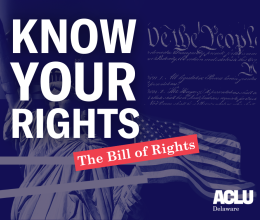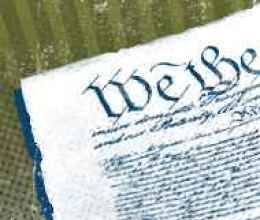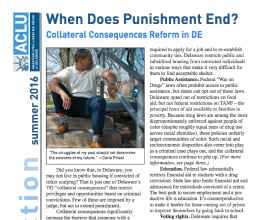In September 2010, the City of Newark gave notice that it intended to amend its housing code. However, the Newark City Council rejected the changes to the city code that would have deprived city residents of important privacy protection after ACLU-DE objected to the proposed amendment.
One modification would have forced all residential tenants to agree in their leases to let city officials into their homes for all inspections required by the city. That would have been a significant departure from existing law, since it would make waiver of our Fourth Amendment protection from unreasonable searches a condition of renting in Newark.
Why Is This A Problem?
The Fourth Amendment of the Constitution bars the government from entering a home without:
- A search warrant granted by a judge after looking at evidence that shows “probable cause,” in other words a very good reason, for permitting inspection or
- Permission from the resident is granted or
- Exigent circumstances exist.
The exigent circumstances exception is important. It means, for example, that while the fire marshal would need a warrant to check for a fire code violation, fire fighters called to a blaze can go right in.
Local Landlords Were Concerned
The ACLU-DE was contacted by two Newark landlords who were concerned that the new law would require them to cooperate in depriving their tenants of Fourth Amendment protection. They were right to be concerned, so ACLU-DE sent a letter to the city attorney providing him with the relevant law.
The letter quoted the 1967 U.S. Supreme Court ruling that Fourth Amendment protections apply to health and safety inspections. It also explained that Newark could not make an end run around the Constitution by insisting that tenants agree to entry when they signed leases. The law prohibits the government from forcing people to waive their constitutional right unless there is a compelling governmental interest to do so.
The letter also reminded the city government of the words of Justice Brandeis that public officials cannot hear too often: "In a government of laws, existence of the government will be imperiled if it fails to observe the law scrupulously. Our government is the potent, the omnipresent teacher. For good or for ill, it teaches the whole people by its example. Crime is contagious. If the government becomes a lawbreaker, it breeds contempt for law; it invites every man to become a law unto himself; it invites anarchy."
-Olmstead v. United States, 277 U.S. 438 (1928) (Louis D. Brandeis, dissenting)
A Newark city councilman responded to the letter by asking for more information. We told him how Newark could achieve its purpose of making sure housing is safe without violating tenants’ rights. At the hearing that evening, the councilman moved that the objectionable provision be deleted from the ordinance before it was voted on. His motion carried.







